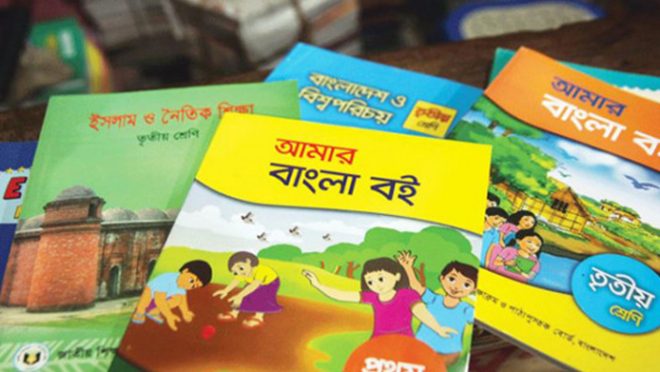Textbook distribution uncertain by February with 10cr copies yet to be printed
Textbook distribution uncertain by February with 10cr copies yet to be printed

The nationwide distribution of textbooks by February faces uncertainty as 10 crore books are yet to be printed.
While Education Adviser Wahiduddin Mahmud and the National Curriculum and Textbook Board (NCTB) insist that the essential books will be distributed by February, printing press owners claim it may take until mid-March to complete the process.
According to officials concerned, of the 40 crore textbooks for grades one to ten, approximately 25% are yet to be printed. This includes 11 crore secondary-level books and one crore primary-level books. Additionally, the binding process is still going on for another 4 crore secondary-level books.
Professor AKM Riazul Hasan, chairman of the National Curriculum and Textbook Board (NCTB), told TBS that as of Monday, 29.35 crore books had been printed. The binding process is still ongoing for 4 crore books, while 5 crore essential books remain to be printed.
Education Adviser Wahiduddin Mahmud recently said that it is possible to print the essential textbooks by February.
NCTB Production Controller Abu Naser Tuku said that of the 9.19 crore primary-level books, 87.16% — equivalent to 8.14 crore — have been printed and distributed.
NCTB Distribution Controller Md Hafizur Rahman said the board’s primary goal was to complete the printing of textbooks by 20 February. “Although this may not be achieved, the process will still be completed within February.”
Reasons for delay
For the first time since 2010, most primary and secondary school students have not received all their books on the first day of the academic year due to a combination of factors, including short timeframes, re-tendering processes, paper shortages and binding issues.
Prof Riazul Hasan said the NCTB had to issue new tenders and develop new manuscripts, along with changes to the curriculum. “As a result, several crore additional books had to be printed, particularly around 6 crore for the tenth grade.”
The NTCB chairman added that the cancellation of book printing in India had no impact on the process.
Regarding the paper and binding crisis, Prof Riazul said that despite providing various facilities to press owners, there were still some delays. The NCTB assisted them with loan processing, paper supply, and binding management. “Despite some remaining challenges, they instructed capable presses to expedite the work.”
He expressed optimism that the essential textbooks would be printed by February.
Regarding the paper supply issue, NCTB Distribution Controller Md Hafizur Rahman said while there were supply problems, press owners would still be able to maximise their work. He added that processing 8,000 tonnes of paper would take a maximum of eight days, meaning there is no longer a paper shortage.
He further said a binding crisis had emerged, so the NCTB was coordinating with the binding association to oversee and expedite the process efficiently.
NCTB’s production and distribution officials said this year, the printing of secondary textbooks is being carried out in 680 lots. Among them, only 18 lots of primary-level books were initially assigned to an Indian company, but this was later cancelled. Additionally, the Army Printing Press was newly involved in the printing process this year, ensuring that the cancellation of printing in India had no impact.
On the other hand, Tofail Khan, former president of the Printing Industry Association and president of the Textbook Printing and Marketing Association, said, “This time, press owners have worked in accordance with various instructions, even beyond the tender requirements.
“The capacity of our press machines has been increased to print between 400 and 800 reams daily. Additionally, some categories of books have been prioritised for printing in a scattered manner.
“Despite all this, we have tried our best to complete the work in a short time. However, the price of paper suddenly increased by Tk30,000 per tonne, and the supply decreased.”
He further said, “Due to the paper crisis, press owners placed an order for 8,000 tonnes of paper through the mediation of the NCTB. However, we did not receive the paper on time. The supplying company has informed us that it will deliver the paper in three instalments.
“They have said that the first instalment will be sent on February 22. Under these circumstances, it is impossible to print the books by February.”
Regarding conducting educational activities without books, Mustari Sultana, assistant headmistress (main morning) of Viqarunnisa Noon School and College, told this newspaper, “Most of the books for grades six, seven, eight and ten have been received. However, there is a crisis in obtaining the books for class nine.
“But students are being taught by downloading the syllabus and books online. Despite this, there are no obstacles to classroom activities.”


